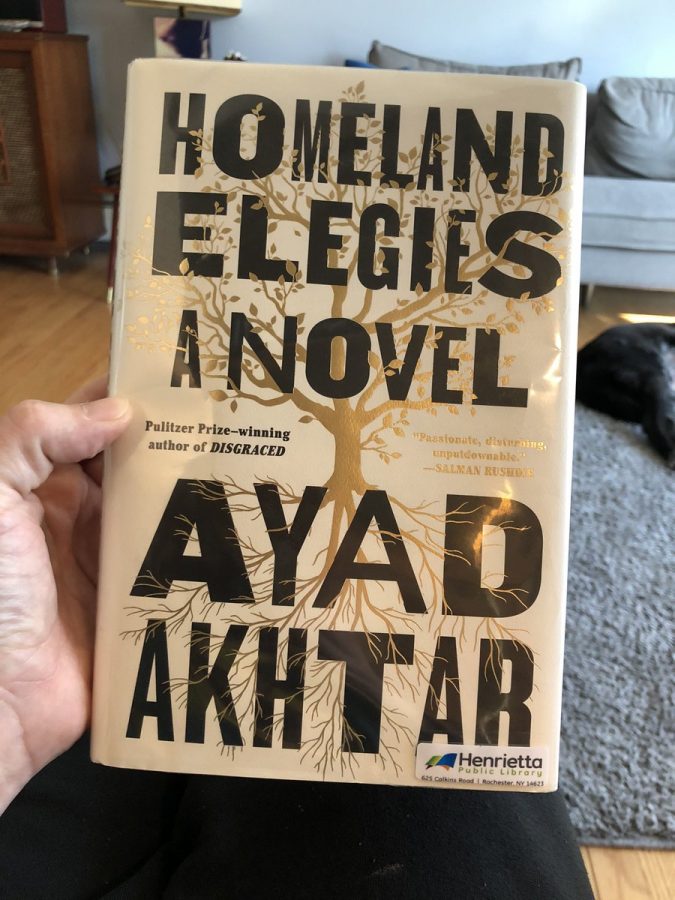A Playwright’s Journey into American Divisiveness: “Homeland Elegies” by Ayad Akhtar
What is the seed of American discontent? There are seemingly countless novels, essays and artists grappling with this evolving question, with everyone from Whitman to Steinbeck attempting to surmise what fuels the persistent divisiveness among Americans. In his newest novel “Homeland Elegies,” Ayad Akhtar exercises his prowess for character and narrative formation to create a novel, blending fiction and reality, that examines how this question of American discontent is redefined for Muslim Americans by the 9/11 attacks and Donald Trump’s presidency.
Albeit fictional, Akhtar’s novel closely mirrors his own life. Similar to his protagonist, Akhtar is an American playwright. His play “Disgraced” awarded him the 2013 Pulitzer Prize for Drama. The play dissects Islamophobia at a small dinner party amongst friends. As viewers watch the evening unfold, tensions rise and the prejudices faced by Muslim Americans in post-9/11 America grow exceedingly obvious and harmful. In “Homeland Elegies,” Akhtar’s narrator experiences the same Islamophobia as the author, making the novel seem more like a memoir or literary nonfiction than a traditional novel. The proceeding success experienced by Akhtar’s narrator creates a captivating story that reevaluates how systems of oppression and wealth function in American discourse.
Particularly, at the novel’s opening, readers are informed that the narrator’s father — a well-known doctor who specializes in rare heart conditions — is called to treat Donald Trump in the early ’90s. At the time, when Trump faced bankruptcy and another failed marriage, the narrator’s father became enamoured with Trump’s sense of reality. Trump was larger than life, treated himself like a king and represented an established example of the quintessential American success story to his Pakistani-American father. As Akhtar’s movement through the narrator’s life evolves and Trump is elected president, he uses striking metaphors to explore how his father — and much of the nation — idolizes this racist and misogynistic man.
“For a thoughtful man — at least one who’d evidenced instances of thoughtfulness with reassuring frequency over the years — the man seemed to be turning into an imbecile, his hodgepodge views like mental flatulence, one fetid odor to another,” writes Akthar about the narrator’s father, who frequently defends Trump in his campaign for the presidency. “To push the metaphor: it had the logic of dysentery, an infection of his political consciousness occasioning wanton noxious discharge. And further: a child sh–s on the floor and sticks its finger in the feces, delights in the odor and relishes the disgust of everyone else.”
While grotesque, this metaphor exemplifies the powerful, occasionally comedic prose that Akhtar uses to dissect our world. In doing so, he acknowledges many prolific writers who came before him, such as Emerson and Whitman, and speculates about the sense of American exceptionalism that fuels Trump’s popularity and gives it meaning within his life. What emerges from this examination is a breathtaking, fast-paced novel that immerses the reader in the mind of someone who feels like they, too, are at a crossroads of success and wealth — much like this country. As Akhtar dissects his narrator’s discontentment, America’s history of racism and discrimination bubbles to the surface, and readers see a full, relatively unbiased view of how America functions.
Named one of The New York Times’ Best Books of 2020, “Homeland Elegies” is a masterpiece of metaphor and dialogue. Its unconventional genre and structure elevate an already important and underrepresented narrative, and Akhtar’s prowess for tackling the dire circumstances of present-day America remain in the forefront of contemporary discussion.








































































































































































































